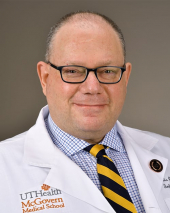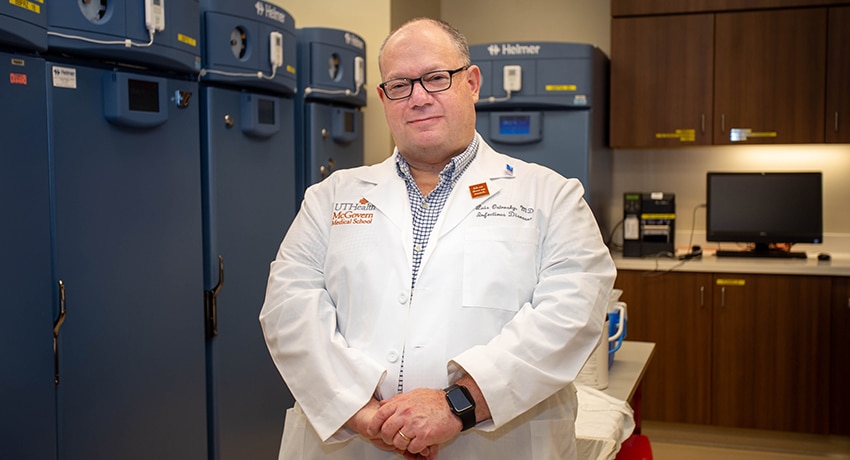
A life-threatening mold infection known as health care-associated Fusarium solani meningitis can be associated with a delayed, but devastating, injury to the brainstem and its blood supply among those infected, according to physicians from UTHealth Houston.
A report, led by first author Nora Strong, MD, and senior author Luis Ostrosky-Zeichner, MD, was published today in the New England Journal of Medicine. Strong is a second-year postdoctoral fellow in infectious diseases with McGovern Medical School at UTHealth Houston, and Ostrosky is professor of medicine and epidemiology, division director of infection diseases, and Memorial Hermann Chair at the medical school.
In the report, the physicians reported their own experience and analyzed data from the clinical presentation, disease course, and management of 13 hospitalized patients in multiple centers.
Between Jan. 1, 2023, and May 13, 2023, an outbreak of Fusarium solani meningitis took place at two clinics in Matamoros, Tamaulipas, Mexico, among patients with otherwise healthy immune systems who underwent surgical procedures involving epidural anesthesia. On May 17, 2023, the Centers for Disease Control and Prevention released a Health Alert Network Health Advisory about the incident.

“The outbreak of this severe mold infection affected primarily young, otherwise healthy people as result of medical tourism,” Strong said. “Patients from Mexico and the U.S. experienced severe, and ultimately mortal, neurologic and vascular injuries as a result of the infection.”
Physicians identified 13 patients with fungal meningitis who had undergone procedures involving epidural anesthesia at one of the two identified medical clinics in Mexico. Although the infection typically affects severely immunocompromised patients, Strong said the cases demonstrate that direct inoculation of Fusarium species into the cerebrospinal fluid can cause severe meningitis in otherwise healthy patients, which is tragically associated with an extremely high mortality rate.
“All 13 patients featured involvement of the brainstem with injury to the basilar and vertebral arteries, which were typically insidious at presentation but progressed,” Strong said. “Over time, multiple patients experienced the narrowing of important blood vessels in their brains, leading to stroke or severe hemorrhages that eventually led to death in many of the patients.”
Nine of the 13 patients died due to vessel injury. Of the four surviving patients, three remain on Fosmanogepix monotherapy, an experimental treatment for invasive mold infections, and one is no longer receiving the antifungal medication. One patient who remains on therapy experienced abulia — a state of diminished motivation — after subarachnoid hemorrhage. The other three patients have no cognitive, sensory, or motor deficits from the infection.
Treatments included systemic antifungal therapy in all cases but one, who presented prior to the identification of the outbreak. Initially, the antifungal therapy helped improve clinical symptoms and cerebrospinal fluid parameters in patients who presented earlier in the outbreak. However, there was a later sudden worsening of the cerebrospinal fluid profile, potentially indicative of rapid fungal growth.
“Eventually, we learned through advanced molecular and microbiological techniques that the fungus was resistant to all antifungal agents, except the experimental drug Fosmanogepix,” Ostrosky-Zeichner said. “Using that, along with state-of-the-art neurosurgical and endovascular techniques, changed the course of the outbreak. Undoubtedly, multidisciplinary work across institutions and agencies saved the remaining patients.”
Other study co-authors with McGovern Medical School at UTHealth Houston included Grant Meeks, MD; Sunil A. Sheth, MD; Louise McCullough, MD, PhD; Chunfeng Tan, MD, PhD; Andrew Barreto, MD, MS; Audrey Wanger, PhD; and Michelle McDonald, DO.
Co-authors with the Infectious Diseases Pathology Branch at the Centers for Disease Control and Prevention included Julian A. Villalba, MD, and Sarah Reagan-Steiner, MD, MPH. Co-authors with The University of Texas Medical Branch included Peter Kan, MD, MPH, and Hashem Shaltoni, MD. Co-authors from The University of Texas Rio Grande Valley included Jose Campo Maldonado, MD; Victoria Parada, MD; and Ameer E. Hassan, DO. Co-authors with the Mycotic Diseases Branch at the Centers for Disease Control and Prevention included Tom Chiller, MD, MPHTM; Jeremy A. W. Gold, MD, MS; and Dallas J. Smith, PharmD, MAS.
McCullough is professor and chair and the Roy M. and Phyllis Gough Huffington Distinguished Chair in the Department of Neurology with McGovern Medical School. She is also affiliated with The University of Texas MD Anderson Cancer Center UTHealth Houston Graduate School of Biomedical Sciences. Wanger is the Robert Greer Professor in the Biomedical Sciences with McGovern Medical School.


